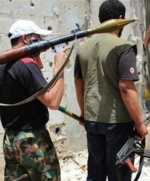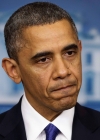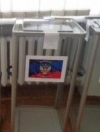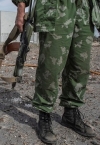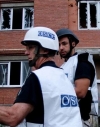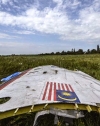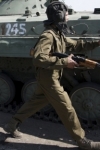The U.S. announcement marked the effective end to a short-lived multimillion-dollar program to train and equip units of fighters at sites outside of Syria, after that program's disastrous launch this year fanned criticism of President Barack Obama's war strategy.
Future training will be greatly scaled back, with the apparent U.S. focus on providing weaponry.
The change in focus comes at a time when the Obama administration is also grappling with a dramatic change to the landscape in Syria's four-year civil war. Russia has begun air strikes that it says are aimed both at supporting its longtime ally, President Bashar al-Assad, and combating Islamic State. Washington has been concerned that Moscow is not aiming solely at Islamic State but at other rebel groups.
"Secretary of Defense Ash Carter is now directing the Department of Defense to provide equipment packages and weapons to a select group of vetted leaders and their units so that over time they can make a concerted push into territory still controlled by ISIL," Pentagon spokesman Peter Cook said in a statement, using an acronym for Islamic State.
The United States said it would also provide air support to rebels as they battle Islamic State, Cook said.
A senior U.S. defense official, speaking on condition of anonymity, said the training would be directed to Syrian rebel leaders, as opposed to training entire infantry units - the previous goal.
The U.S. military began training for up to 5,400 fighters a year in May, what was seen as a test of Obama's strategy of having local partners combat Islamic State militants and keep U.S. troops off the front lines.
But the more than $500 million program was troubled from the start, with some of the first class of fewer than 60 fighters coming under attack from al Qaeda's Syria wing, Nusra Front, in their battlefield debut.
U.S. support would now focus on weapons, communications gear and ammunition, the official said, speaking on condition of anonymity, adding the re-envisioned program would start in "days." The official declined to say how many Syrian rebel leaders would be trained.
U.S. Defense Secretary Ash Carter said in the statement he believed the changes would "over time, increase the combat power of counter-ISIL forces in Syria."
"I remain convinced that a lasting defeat of ISIL in Syria will depend in part on the success of local, motivated, and capable ground forces," he said.
The Pentagon did not name which groups would receive support.
Last week, the Obama administration was considering extending support to thousands of Syrian rebel fighters, including along a stretch of the Turkey-Syria border, as part of the revamped approach to Syria.
The United States would also support members of the Syrian Arab Coalition, under that plan.
Speaking to reporters during a visit to London, Carter said the new U.S. effort would seek to enable Syrian rebels in much the way the United States had helped Kurdish forces to successfully battle Islamic State in Syria.
"The work we've done with the Kurds in northern Syria is an example of an effective approach where you have a group that is capable, motivated on the ground, that you can enable their success," Carter told a news conference.
"That's exactly the kind of example that we would like to pursue with other groups in other parts of Syria going forward. That is going to be the core of the president's concept."
After Islamic State's brutal offensive through northern Iraq in June 2014, Obama asked Congress for an initial $500 million to "train and equip" Syria's opposition fighters, whom he later described as "the best counterweight" to Islamic State militants and a key pillar in his campaign to defeat them.
The plan reflected the priorities of a president who was reluctant to get entrenched in another Middle East conflict, but who needed a ground force to complement U.S. air strikes against Islamic State in Syria.Source:http://en.censor.net.ua/n355626
Future training will be greatly scaled back, with the apparent U.S. focus on providing weaponry.
The change in focus comes at a time when the Obama administration is also grappling with a dramatic change to the landscape in Syria's four-year civil war. Russia has begun air strikes that it says are aimed both at supporting its longtime ally, President Bashar al-Assad, and combating Islamic State. Washington has been concerned that Moscow is not aiming solely at Islamic State but at other rebel groups.
"Secretary of Defense Ash Carter is now directing the Department of Defense to provide equipment packages and weapons to a select group of vetted leaders and their units so that over time they can make a concerted push into territory still controlled by ISIL," Pentagon spokesman Peter Cook said in a statement, using an acronym for Islamic State.
The United States said it would also provide air support to rebels as they battle Islamic State, Cook said.
A senior U.S. defense official, speaking on condition of anonymity, said the training would be directed to Syrian rebel leaders, as opposed to training entire infantry units - the previous goal.
The U.S. military began training for up to 5,400 fighters a year in May, what was seen as a test of Obama's strategy of having local partners combat Islamic State militants and keep U.S. troops off the front lines.
But the more than $500 million program was troubled from the start, with some of the first class of fewer than 60 fighters coming under attack from al Qaeda's Syria wing, Nusra Front, in their battlefield debut.
U.S. support would now focus on weapons, communications gear and ammunition, the official said, speaking on condition of anonymity, adding the re-envisioned program would start in "days." The official declined to say how many Syrian rebel leaders would be trained.
U.S. Defense Secretary Ash Carter said in the statement he believed the changes would "over time, increase the combat power of counter-ISIL forces in Syria."
"I remain convinced that a lasting defeat of ISIL in Syria will depend in part on the success of local, motivated, and capable ground forces," he said.
The Pentagon did not name which groups would receive support.
Last week, the Obama administration was considering extending support to thousands of Syrian rebel fighters, including along a stretch of the Turkey-Syria border, as part of the revamped approach to Syria.
The United States would also support members of the Syrian Arab Coalition, under that plan.
Speaking to reporters during a visit to London, Carter said the new U.S. effort would seek to enable Syrian rebels in much the way the United States had helped Kurdish forces to successfully battle Islamic State in Syria.
"The work we've done with the Kurds in northern Syria is an example of an effective approach where you have a group that is capable, motivated on the ground, that you can enable their success," Carter told a news conference.
"That's exactly the kind of example that we would like to pursue with other groups in other parts of Syria going forward. That is going to be the core of the president's concept."
After Islamic State's brutal offensive through northern Iraq in June 2014, Obama asked Congress for an initial $500 million to "train and equip" Syria's opposition fighters, whom he later described as "the best counterweight" to Islamic State militants and a key pillar in his campaign to defeat them.
The plan reflected the priorities of a president who was reluctant to get entrenched in another Middle East conflict, but who needed a ground force to complement U.S. air strikes against Islamic State in Syria.Source:http://en.censor.net.ua/n355626








